The Homeschooling Movement Explained

Key Takeaways:
- Searches for “homeschooling online” went up 365% in the past year compared to the previous 12 months.
- Homeschooling interest is greatest in Portland, Atlanta, and Miami based on online search volume.
- 42% of parents felt more capable of homeschooling kids in elementary school, while 70% were least confident in their ability to homeschool high schoolers.
- Providing a safer environment is the No. 1 reason people want to homeschool their children.
Homeschooling Interest Across America
With homeschooling becoming more common in recent years, we wanted to find out how many Americans are considering homeschooling their children. We had online search volume data studied and also commissioned an online survey of over 1,000 American parents (both current and aspiring) to uncover how popular the idea of homeschooling is across the U.S. today. Read on to find out and learn some tips for success from experienced home educators.
Mapping Homeschooling Interest in the U.S.
To explore homeschooling interest in the U.S., researchers first looked at online searches for homeschool-related terms. In which states are parents researching homeschooling the most?
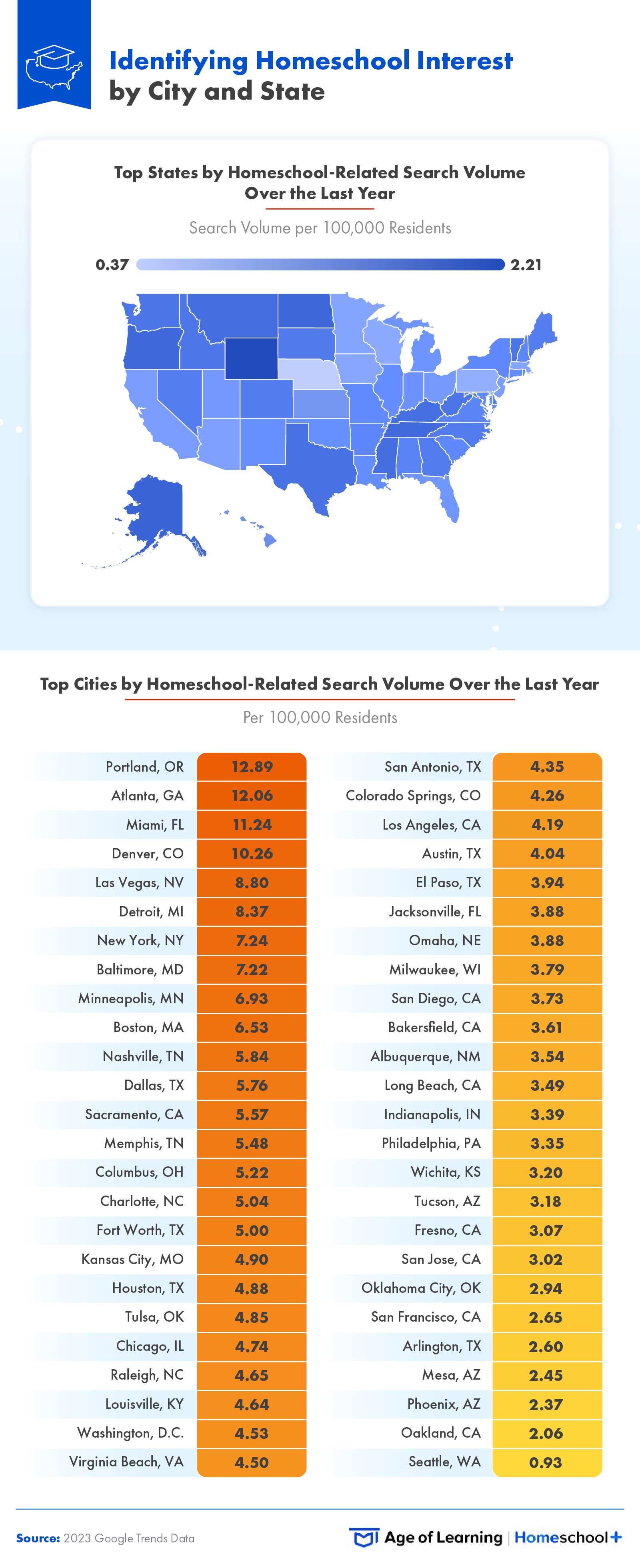
Interest in homeschooling spread across the country. Wyoming was the state with the most residents searching online for homeschooling information, but the top five cities spread from coast to coast. According to search volume per 100,000 residents, the five most interested major cities were:
- Portland, OR
- Atlanta, GA
- Miami, FL
- Denver, CO
- Las Vegas, NV
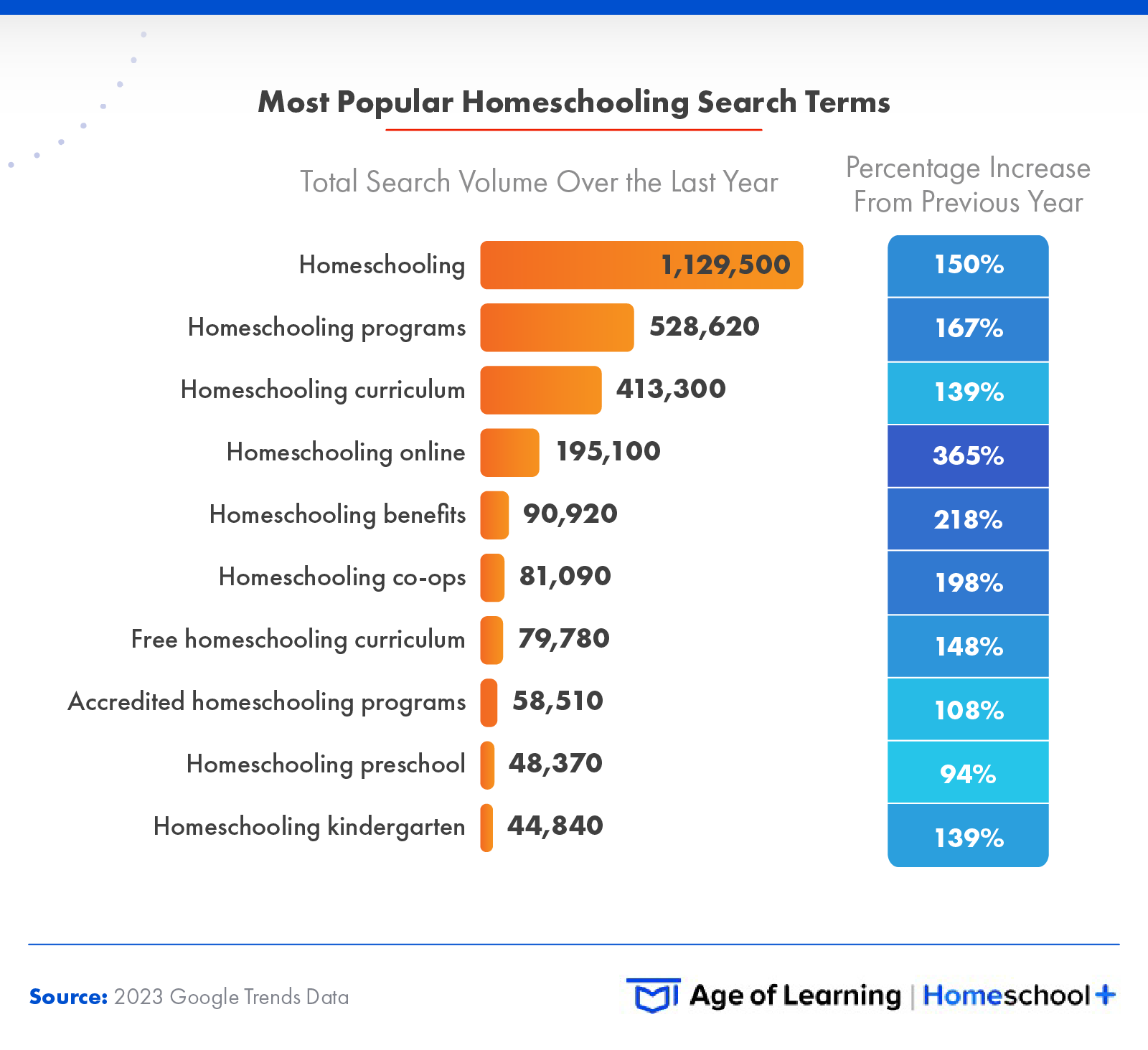
The term “homeschooling” was searched more than 1.1 million times over the past year, an increase of 150%. The second and third most-searched terms were “homeschooling programs” and “homeschooling curriculum,” both of which were about half as common as searches for “homeschooling.” The search term with the largest increase in search volume over the past 12 months was “homeschooling online,” with an increase of 365%.
Online learning has become integral in every level of education, and clearly, homeschooling is no exception. Tech is taking over schools across the world, and students spend increasingly more time using educational apps. Many parents are considering eliminating the hassle of taking kids to in-person instruction; current home educators already demonstrate how efficient and beneficial this lifestyle change can be.
Examining Interest in Homeschooling
Parents in every part of the U.S. show interest in homeschooling, but how does interest in homeschooling compare to interest in other types of schooling? Furthermore, how does interest in homeschooling vary by generation and age of children in the home?
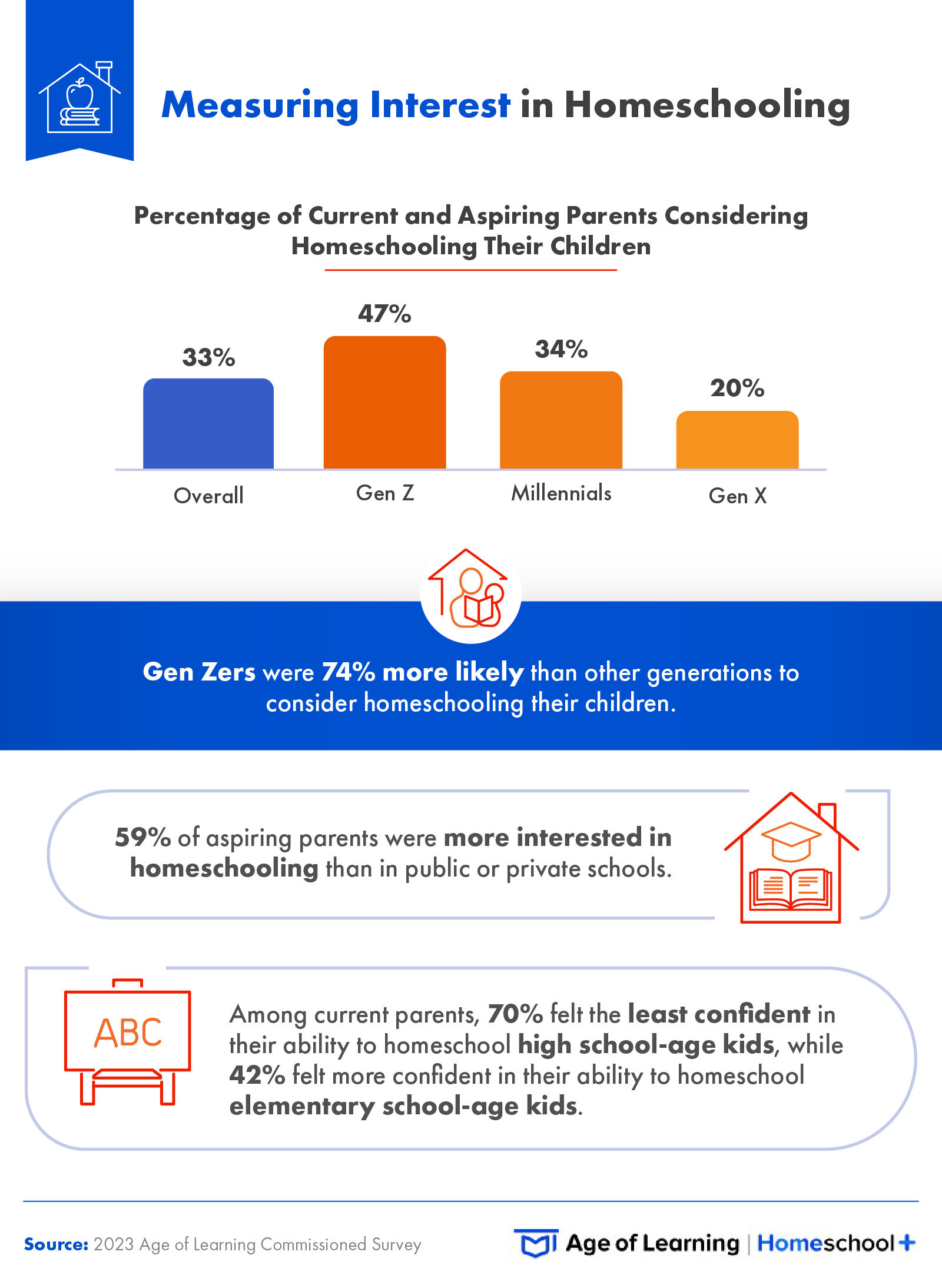
Considering the spike in internet searches for homeschooling-related terms over the past year, it’s no surprise that the majority of aspiring parents (59%) were more interested in homeschooling than in public or private schooling. The main factor for most parents when selecting schooling preferences was their kids’ ages. Almost half of the parents surveyed (42%) felt more capable of homeschooling kids in elementary school, while 70% were least confident in their ability to homeschool high schoolers.
Since high school curriculum is more advanced, it’s understandable that parents might be hesitant to take it on—but they don’t have to be. Support is available to ensure your teen gets the education they need. Many community colleges even offer courses to high school-age students, giving them a boost if they decide to pursue a degree.
Next, we’ll see why so many parents are turning to homeschooling these days.
Motivations Behind Homeschooling
There are countless reasons to consider homeschooling. Let’s see why Americans increasingly choose home education over public or private education.
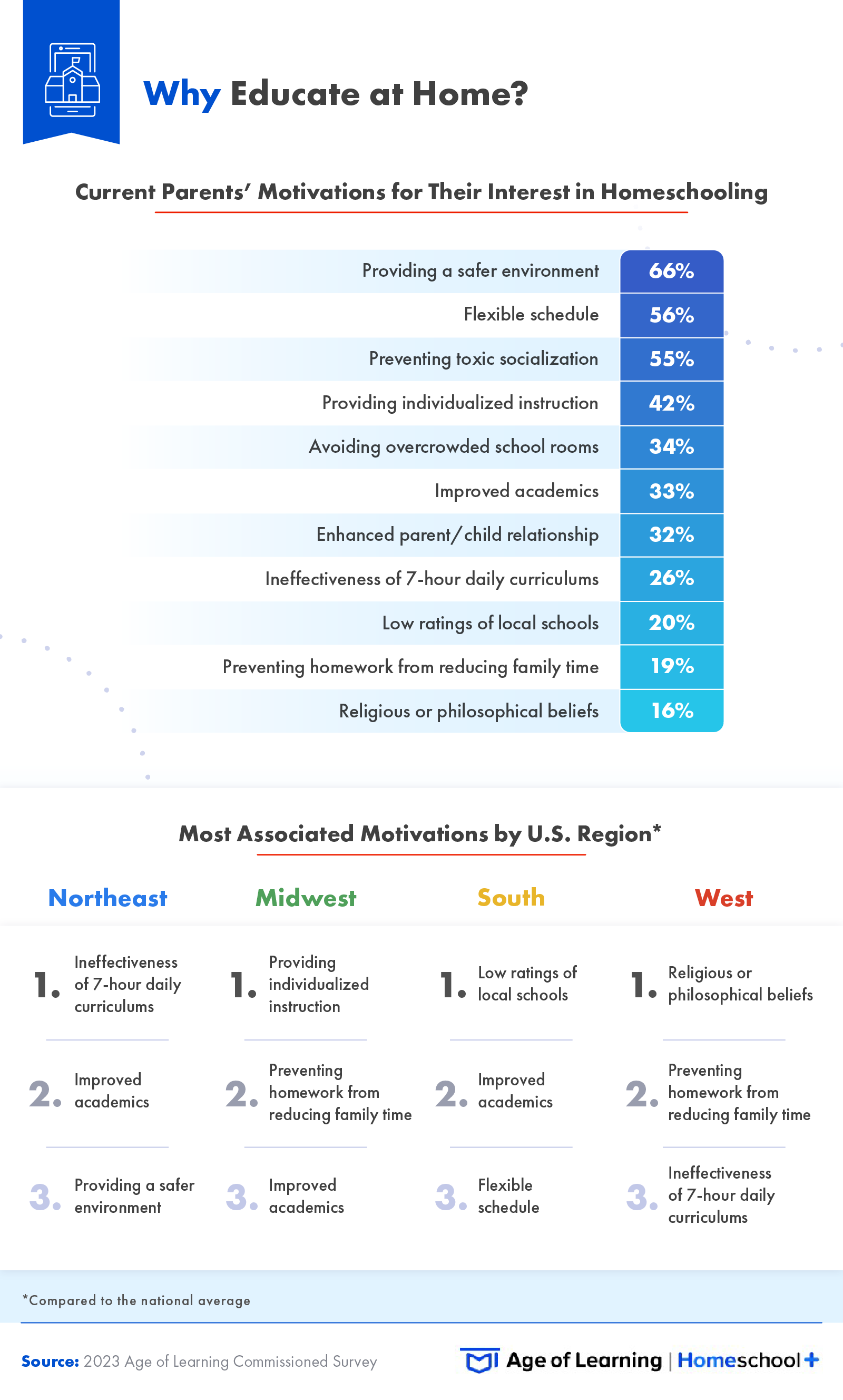
When asked about their reasons for looking into homeschooling, the most common responses of current parents were:
- Providing a safer environment (66%).
- Flexible schedule (56%).
- Preventing toxic socialization (55%).
Aspiring parents had similar reasons for considering homeschooling:
- Providing a safer environment (63%).
- Providing individualized instruction (53%).
- Preventing toxic socialization (50%).
School safety means different things to different people. Many parents are worried about their kids’ physical safety at school due to increased school violence in recent years. Parents are also concerned about how school social settings might affect their kids’ behavior and mental health.
Kids spend over half of their waking hours at school, so it’s no wonder their school environment plays a big role in their mental and emotional development. That’s likely why more than half of current and aspiring parents were considering homeschooling to prevent toxic socialization. And while safety was a top concern, toxic socialization could be considered a safety issue.
Once we discovered that the top motivation for homeschooling in the U.S. is student safety, we wanted to explore which motivations are most associated with each region. So, we compared the answers of respondents in each region to the national average (using the difference of means), which helped us identify which motivations are most important for parents in each part of the U.S.
Current northwestern parents largely said they feel seven-hour daily curriculums are ineffective teaching tools. Midwesterners were most likely to name individualized instruction as the primary reason to consider homeschooling, and for southerners, it was the low ratings of their local schools. Meanwhile, westerners were most likely to associate it with their religious or philosophical beliefs.
Whatever parents’ reasons for choosing to homeschool, there are some things they can do to improve their chances of success. Current and former homeschool parents offered up some great tips for achieving the best homeschooling experience for you and your family:
- Establish and stick to a curriculum and daily schedule.
- Make learning fun, be creative, and get outside when you can.
- Take advantage of online videos and podcasts for tips from other home educators.
- Don’t be too rigid with your kid(s) or yourself; every child is different, and you don’t have to be perfect.
Weighing the Advantages and Disadvantages
Homeschooling has many benefits, but what are the drawbacks, and how can parents overcome them?
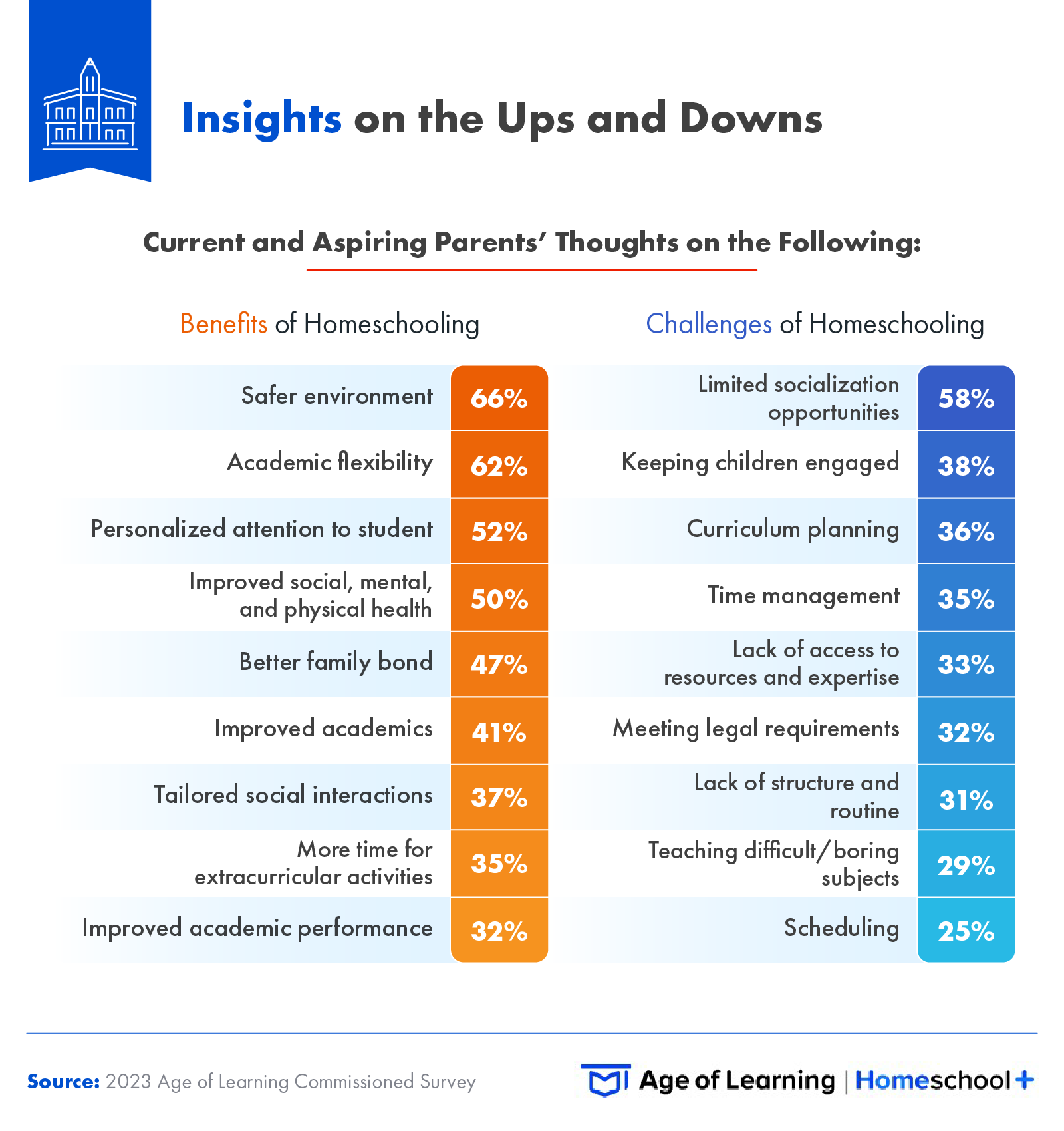
The most common concern current and aspiring parents had about homeschooling was limited opportunities for child socialization (58%). However, kids can socialize in many ways without attending public or private school. Parents can enroll their kids in extracurricular activities like scouts, sports, theater and the arts, where they can socialize with their peers.
Many families also participate in local homeschool groups which plan activities for the children involved, and weekday enrichment programs are available at zoos, museums, historical sites, and more. These are all great ways to add hands-on activities where homeschool children can interact.
The financial cost of homeschooling was another concern for 20% of current and aspiring parents. But many families who never would have considered homeschooling have looked into it because of the COVID-19 pandemic. As a result, many who felt they couldn’t balance a job with being a home educator discovered that not only was it doable, but it was preferable for the flexibility and increased time spent with their children.
In addition, many states have funds allocated to support homeschool families via public homeschool charters, tax deductions, tax credits, and allotments. While flexibility of schedule and curriculum are major perks of homeschooling, there may be state standards you need to comply with. You can visit your state’s department of education to find information on homeschooling standards. With those standards in mind, you’re free to plan lessons and craft the best learning experience for you and your child.
To Test or Not to Test
As the popularity of homeschooling rises, so does the debate over state standards and standardized testing. Let’s see what survey respondents had to say on the matter.
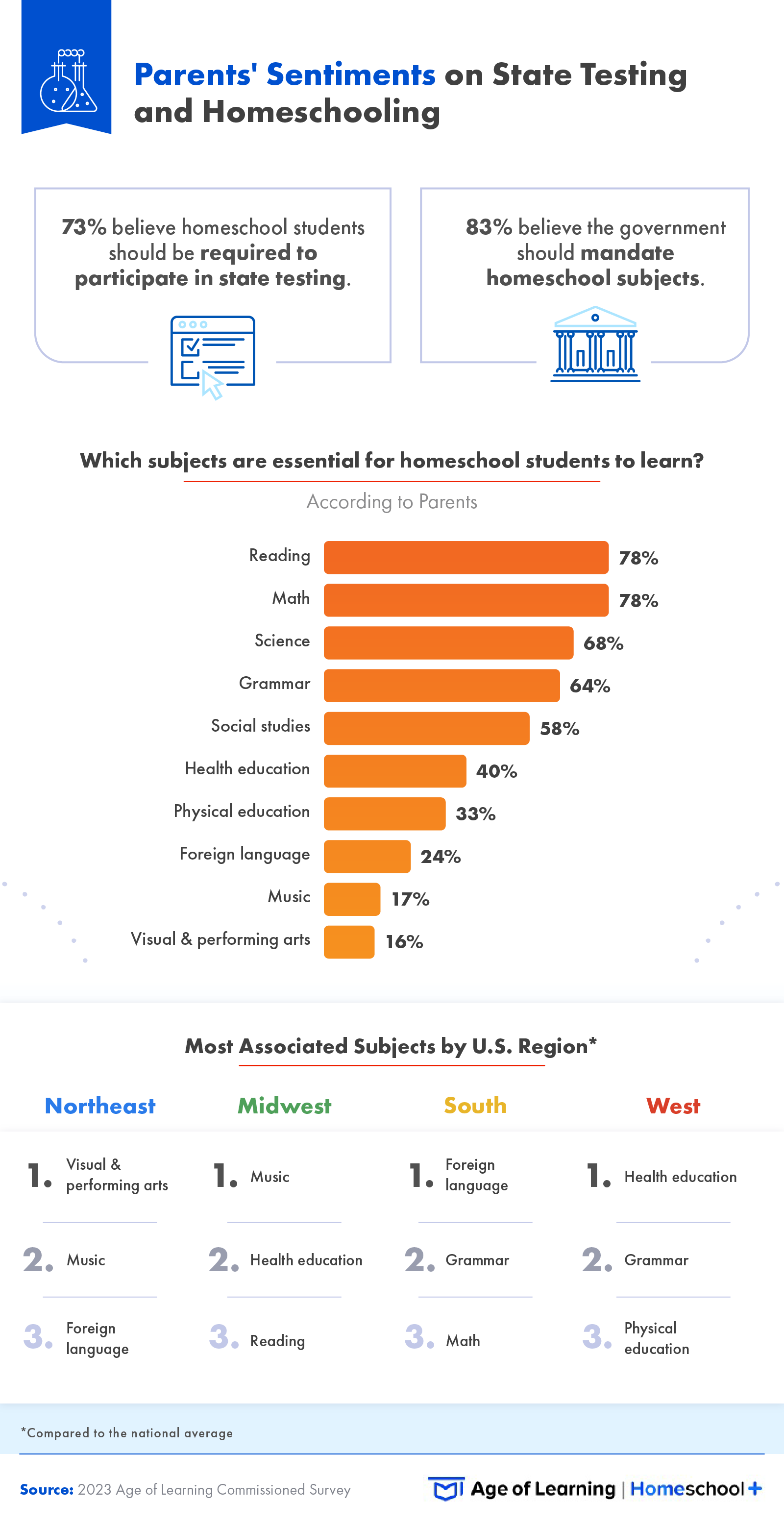
An overwhelming majority of current parents believed state standards and testing were important for homeschooling. A surprising 83% of parents believed the government should mandate subjects for homeschooled students. Even if not currently required by law, home educators may want to adhere to Common Core State Standards, which determine the academic framework of what public school students must learn in order to succeed. These standards aren’t a requirement, and not everyone wants to follow them.
Some parents may also want to opt out of having their children take mandatory standardized tests, but many others support them. Nearly three-quarters (73%) of current parents believed homeschool students should have to participate in state testing, but this sentiment varied by U.S. region:
- West: 77%
- Northeast: 76%
- Midwest: 75%
- South: 69%
Why Choose Homeschooling?
American parents and parents-to-be are increasingly interested in homeschooling their children. Parents are attracted to the safety, flexibility, individualization, and bonding opportunities homeschooling can present. While some parents may worry about the demanding workload of homeschooling or a lack of social interaction for their kids, there are countless resources, online educational tools, and extracurricular opportunities to overcome these challenges. When you choose to homeschool, you can reclaim control of your children’s education and provide a unique experience tailor-made for your family.
About Homeschool+
We support you, the home educator, in creating a customized learning environment where you and your children can thrive and their love of learning and academic success shines. Homeschool+ curriculums include fully adaptive math and reading programs for children ages 4-8, plus 12 online courses covering art, science, social studies, and more, along with robust home educator tools that support your unique homeschool.
Methodology
For this campaign, researchers commissioned by Age of Learning used Google Trends data from 2021 to 2023 to analyze search volume data for interest in homeschooling across all 50 states and the most populated cities in the U.S.
Age of Learning also commissioned an online survey of 1,064 parents and aspiring parents to explore their interest in homeschooling. Among them, 59% were women, and 41% were men. The parental breakdown was as follows: 72% were parents, and 28% were aspiring parents. Of the parents surveyed, 12% currently homeschool their children, and 17% have in the past. The generational breakdown was as follows: 15% were Gen Z, 62% were millennials, and 23% were Gen X.
Fair Use Statement
Are you considering homeschooling for your family? If you learned something helpful from this research and would like to share this article, you’re welcome to do so for any non-commercial purpose as long as you include a link to this page.